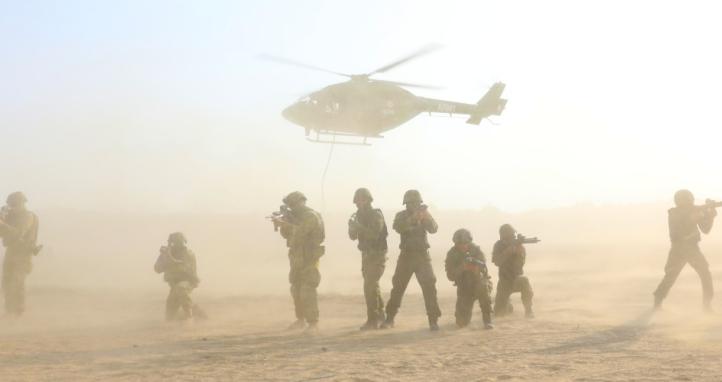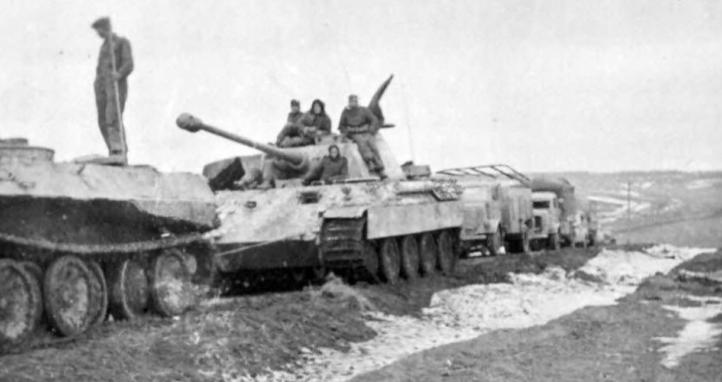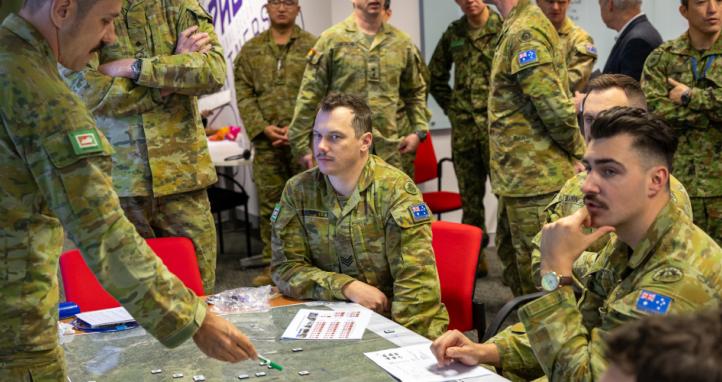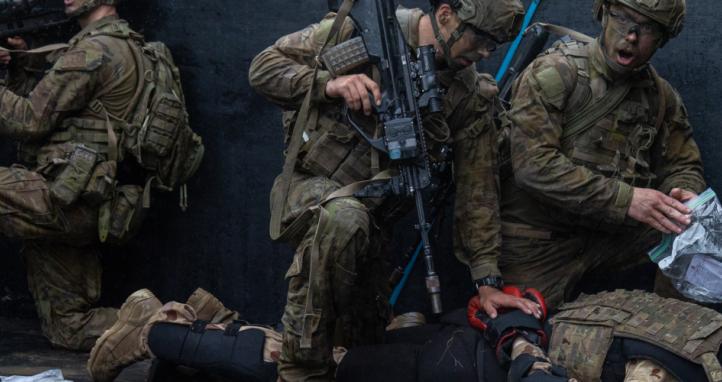Facts and figures
| Government type | Communist Party-led State |
| Notable people |
|
The ‘Know Your Region’ series is designed to support unit and individual professional military education on the South East Asian region. It’s important for all serving members of our military to have a foundational knowledge of the countries and issues in the Indo-Pacific.
VIETNAM – DIPLOMACY
On this page:
- Overview
- Government and Politics
- Foreign Policy and Diplomacy
- Vietnam and China
- Vietnam and the US
- International Forums
Overview
Vietnam has a history stretching back more than 4,000 years. The first independent monarchy on the Indochinese Peninsula emerged in the 10th century. This paved the way for successive imperial dynasties as the nation expanded to the south and took the Mekong Delta. In the late 19th century the Nguyễn dynasty was conquered and colonised by the French, becoming part of French Indochina and known as Annam. Designated as an economic colony, the French exploited the land and built transport networks to improve resource extraction during their rule. The Republic of France maintained full control over their colonies until the Asia-Pacific War led to the Japanese Empire's invasion in 1940. After World War II and the abdication of Emperor Bảo Đại, modern-day Việt Nam (Vietnam) declared independence on 02 September 1945. The Emperor explained his abdication by saying, 'We would prefer to be a citizen of an independent country rather than emperor of an enslaved one'. However, France refused to relinquish involvement in internal Indochina affairs until its 1954 defeat in the First Indochina War by communist Viet Minh forces led by Hồ Chí Minh.
Under the Geneva Accords of 1954, the nation was divided into two rival states: the communist North and anti-communist South. Hostilities intensified in the 1960s until the outbreak of the Vietnam War, and extensive foreign influence; the United States and their allies backed South Vietnam, while the Soviet Union and the People's Republic of China supported the North. The conflict ended with North Vietnamese victory and reunification of the country under communist rule in 1975. For more information about the Vietnam War, see the Special Issue in the Vietnam series.
On 02 July 1976 the Socialist Republic of Vietnam (Cong Hoa Xa Hoi Chu Nghia Viet Nam) was established, merging the North and South. Despite the return of peace, the war had left Vietnam devastated with a death toll of up to 3.8 million. For over a decade the young communist state experienced little economic growth because of war-time destruction, conservative leadership policies, brief military actions against Cambodia and China, the persecution and mass exodus of South Vietnamese and other minorities, and prolonged international isolation. At the Sixth National Congress of the Communist Party of Vietnam (CPV) in December 1986, reformist politicians took charge of the government. This new leadership implemented the Doi Moi or Renovation policies to carefully transition from a planned economy to a socialist-oriented market economy and so saw the facilitation of Vietnamese integration into world politics and the global economy.
To learn more about Vietnam’s geopolitics, watch the video by Caspian Report and see below:
- Videos
- Podcasts
- Articles
- BBC | Vietnam profile - Timeline
- National Geographic | These elephant-riding warrior sisters freed ancient Vietnam from Chinese rule
- Vietnam Net | The 'treasure of treasures' of the Nguyen Dynasty
- History | 6 Events That Laid the Groundwork for the Vietnam War
- Vietnam Plus | Declaration of Independence - Will, aspirations of Vietnamese people
Government and Politics
The politics of Vietnam are defined by a socialist republic framework which is ultimately controlled by a single-party, the CPV, often referred to simply as Dang (the Party) or Dang ta (our Party). There is a long-standing arrangement to share power among the 'four pillars' of: Communist Party Chief, President, Prime Minister, and Chair of the National Assembly. Recently elected on 26 July 2021, President Nguyen Xuan Phuc, is the Commander-in-Chief of the armed forces and decides on executive branches. The government is the main executive state power of Vietnam and headed by the current Prime Minister Pham Minh Chinh. Both positions have a five-year term, but the Prime Minister's tenure is renewable once. The National Assembly is a unicameral legislative body, the one house has 500 members who are elected by popular vote to serve four-year terms. The country is divided into 58 provinces (tinh) and five municipalities (thanh pho). Vietnam's judicial system is independent of the executive and governed by the Constitution of Vietnam. Under a civil law system based upon Socialist legality, the highest court is the Supreme People's Court (Tòa án Nhân dân Tối cao).
The aim of the CPV is to make Vietnam a strong, independent, prosperous, and democratic country with an equitable and civilised society, to realise socialism and ultimately, communism. Originally guided by Marxism-Leninism and Ho Chi Minh Thought, recent efforts to broaden political ideology place more emphasis on nationalism, developmentalism, and being the protector of tradition. The socialist leaders act as the vanguard of the whole nation and maintain tight control on political expression but have demonstrated some modest steps towards better protection of human rights.
Vietnam continues to experience small-scale protests, the vast majority connected to either land-use issues, calls for increased political space, or the lack of equitable mechanisms for resolving disputes. The small-scale protests in the urban areas are often organised by human rights activists, but many occur in rural areas and involve various ethnic minorities such as the Montagnards of the Central Highlands, Hmong in the Northwest Highlands, and the Khmer Krom in the southern delta region.
The two political priorities on the Vietnamese domestic front are eliminating corruption and COVID-19 across the country. The re-election of Nguyễn Phú Trọng as General Secretary of the Central Committee of the CPV for a third term – despite his election breaching Party rules – was based on combatting corruption. Speaking on the topic, Trong said the corruption fight so far should be considered an, 'initial containment and prevention' strategy and will face future challenges.
In his first speech after being elected Prime Minister, Chinh vowed to resolutely and firmly defend the country's independence, sovereignty, and territorial integrity. The new leadership will continue Hanoi's anti-corruption push, defeat the coronavirus pandemic and then try to kick-start economic recovery. Lessons learned from Vietnamese authorities’ experience with SARS in 2003 meant they reacted rapidly to COVID-19 in early 2020. The one-party state was decisive about the seriousness of the health crisis and imposed health policies with a degree of severity.
For more information on Vietnam’s political system, access the following resources:
- Videos
- Podcasts
- Articles
- East Asia Forum | Full steam ahead on Vietnam's anti-corruption campaign
- Council on Foreign Relations | Vietnam: A Successful Battle Against the Virus
- Australian Human Rights Institute | New research into status of women in Vietnam's political system
- ABC | Vietnam re-elects 76-year-old Communist Party chief Nguyen Phu Trong
Foreign Policy and Diplomacy
Vietnam emerged from international isolation after troops withdrew from Cambodia in 1989. Within months of the Paris Agreements in 1991, Vietnam established diplomatic and economic relations with the Association of South-East Asian Nations (ASEAN) member-states and with most countries of Western Europe and East-Asia. See the Vietnamese Government's Portal for details on when normalisation of diplomatic relations took place. Following nearly two decades of carrying out the Doi Moi renewal policy, Hanoi saw that the 21st century presented both opportunities and challenges. Reiterating the diplomatic motto: Vietnam is willing to become a friend and reliable partner of all countries in the world community, striving for peace, independence, and development. This self-declaration reflects Hanoi's constructive approach in all areas and is complemented by the two driving concepts of Vietnamese foreign policy, being: self-reliance and proactive international integration.
On 07 January 2016, former Prime Minister Dung approved the Overall strategy for international integration through 2020, vision to 2030 which provides a comprehensive insight into Vietnamese thinking on foreign policy and underlines areas in need of improvement. This key document identifies Hanoi's overall objective to turn Vietnam into a modern-oriented industrialised country and improve people's living standards all while maintaining sovereign independence and the 'socialist Fatherland'. Setting out specific objectives to take full advantage of favourable global conditions and so heighten the country's position and prestige in the world. Acknowledging 'the degree of international integration remains at [a] low level, mainly in width'. It goes on to subtly note the internal concerns of the CPV, where 'the process of deeper integration into the region and the world' expose 'the risk of vulnerability due to global happenings and fiercer competition'. This 'increases the danger of lagging behind if the targets set by the Party are not achieved'.
France recognised North Vietnam on 12 April 1973. The former colonial power has maintained close relations through historical connections and Vietnam's presence in the Organisation Internationale de la Francophonie. The widespread normalisation of Vietnamese foreign relations was realised in the 1990s. For example, full diplomatic relations were restored with New Zealand, which opened its embassy in Hanoi in 1995 while Vietnam established an embassy in Wellington in 2003. The Soviet Union backed the CPV for decades, such close and friendly ties continue with the Russian Federation and looser links with the regime in North Korea. Currently, the country's top diplomat is the newly elected President Phuc. He has been credited for keeping the nation's economy on a steady upward trajectory – despite the pandemic – in previous government positions. President Phuc is well-known as being a sceptic of Beijing's intentions and supporter of warmer ties with Washington.
From a war-torn and isolated socialist state in the late 1970s, Vietnam's diplomatic strength and position in geopolitics has significantly improved. The Doi Moi era emphasised proactive international integration and foreign policy will be carefully calibrated to ensure balance is conserved. The most important influence on Hanoi’s diplomacy towards other major powers has been a perceived need to prepare for future Chinese assertiveness. Efforts to develop people-to-people external relations are underway directed by the motto: 'proactiveness, flexibility, creativeness and efficiency'. In coming years, Vietnam's diplomacy will make the best use of opportunities and steadfastly work for mobilisation of favourable conditions for the cause of modernisation and industrialisation of the country.
To learn more about Vietnam’s diplomatic ties with various countries, see the resources below:
- Videos
- Podcasts
- Articles
- Council on Foreign Relations | Vietnam and India Cement an Increasingly Vital Relationship in Southeast Asia
- Vietnam Economic News | French Prime Minister begins official visit to Vietnam
- Lowy Institute: The Interpreter | Russia and Vietnam: An alliance of convenience
- Lowy Institute: The Interpreter | The ups and downs of the Vietnam-North Korea relationship
- Vietnam Plus | Vietnamese, Cuban parties strengthen ties
Vietnam and China
Throughout its 4,000-year history, Vietnam's main foreign relationship has been with various Chinese dynasties. Following the partition of Vietnam in 1954 during the Cold War, North Vietnam deepened relations with the Eastern Bloc. After a break in relations due to the brief but costly Sino-Vietnamese War in 1979, the re-establishment of full diplomatic ties between Vietnam and China's Ministry of Foreign Affairs took place in 1991. The two nations settled previous tensions and concluded a land border demarcation agreement in 1999. Though Vietnam and China are now formally at peace, historical animosity lingers in popular memory and significant territorial tensions remain between the two countries over the South China Sea.
Vietnam's bilateral ties with the People's Republic of China are often complex and contradictory. On the one hand, Vietnam treats China with great respect and attempts to work with Beijing on a range of security and economic issues. Indeed, Hanoi in 2008 raised China to the level of a 'comprehensive strategic cooperative partnership' – the highest designation it accords to any major power. On the other hand, Hanoi is increasingly frustrated by growing Chinese assertiveness in the disputed South China Sea. Vietnam is also deeply suspicious of Beijing's intentions to leverage the Belt and Road Initiative for 'win-win' outcomes, both within Vietnam and in relations with close Vietnamese partners, Cambodia and Laos. The CPV's assessment is that Beijing is unlikely to abandon its expansive ambitions in the South China Sea. This informs the Vietnamese strategy on the maritime disputes as a long-term consistent act of balancing, cooperation and struggle, alongside international integration. For resources on the long history and contemporary status of China-Vietnam relations, see below:
- Videos
- Podcasts
- Articles
Vietnam and the US
After a 20-year hiatus of severed ties, US President Bill Clinton and Vietnamese Prime Minister Vo Van Kiet announced their decision to normalise diplomatic relations between the two countries on 11 July 1995. US relations with Vietnam have become deeper and more diverse in the years since political normalisation, as Vietnam succeeded with its 'close the past, look forward to the future' policy.
The Council on Foreign Relations presents a backgrounder on the evolution of US-Vietnam ties since the Vietnam War. In May 2016, former US President Barack Obama further normalised relations with Vietnam after he announced the lifting of an arms embargo on sales of lethal arms to Vietnam. The bilateral relationship has become even more important to Washington as other regional actors have drawn closer to China. See the Cove's article on the Philippines Diplomacy for an explanation of Filipino President Rodrigo Duterte's pivot towards Beijing.
However, Hanoi is still considering the diplomatic and economic fallout of aligning more closely with Washington. Considering the close economic ties with China – their largest two-way trading partner – many Vietnamese officials are wary of scaring off Chinese investors. Vietnamese strategists have reservations on whether Washington would come to their country's defence should a major conflict erupt in the South China Sea. Marking an upgrade in relations, the first US aircraft carrier sent to Vietnam since the Vietnam War was a symbolic joint move to counter China's expansive maritime claims in January 2018. Despite their historical past, today Vietnam is considered to be a potential ally of the United States, especially in the geopolitical context of the territorial disputes in the South China Sea and in containment of Chinese expansionism.
For more information on the relationship between Washington and Hanoi, access the resources below:
- Videos
- Podcasts
- Articles
- VOA | Vietnam President to Seek Allies Against COVID-19 During US Visit
- The Diplomat | The Evolution of Vietnamese Foreign Policy After the 13th Party Congress
- The Interpreter | Vietnam's 2020 strategy: a year of diplomatic force-multipliers
- Reuters | US aircraft carrier to visit Vietnam in post-war first
- Council on Foreign Relations | Asia Unbound: Vietnam's Response to the United States' Changing Approach to the South China Sea
International Forums
Vietnam recognises the importance of growing global interdependence and is proactive in multinational forums in accordance with the country's strengths and interests. Such prominent standing on international forums is a force multiplier for Vietnam's foreign policy; adding diplomatic responsibility but providing opportunities for Hanoi to engage the international community in its own strategic interests.
Under the Doi Moi framework, Vietnam worked to regularise relations with the world financial system. Following the lifting of the US veto on multilateral loans to the country in the 1990s, Vietnam became a member of the World Bank, the International Monetary Fund (IMF), and the Asian Development Bank. A significant turning point was Vietnam's acceptance into ASEAN in July 1995, followed by the Asia-Pacific Economic Cooperation (APEC) forum in November 1998 and became a member of the World Trade Organisation (WTO) in November 2006.
Although a relative newcomer, Vietnam has already participated as a non-permanent member of the United Nations Security Council twice. Vietnamese armed forces have contributed to its first UN peacekeeping operations in South Sudan, with the first Vietnamese peacekeepers sent to the African country in 2018. Vietnam is party to several international agreements on the environment, such as the Climate Change-Kyoto Protocol and Climate Change-Paris Agreement.
The CPV's foreign policy has expanded bilateral and multilateral cooperation with countries around the world, with great importance attached to close neighbours. Over the past three decades, the countries in the Mekong River Basin – Cambodia, China, Laos, Myanmar, Thailand, and Vietnam – formed closer ties under the Greater Mekong Sub-Region (GMS). The implementation of the 3C strategies, namely 'Connectivity, Community, and Competitiveness', have strengthened people-to-people bonds and collaboration on common concerns. Recently, Prime Minister Chinh called on the GMS countries to step up on close cooperation to contain COVID-19, including promoting access to vaccines and harmonising the regional supply chain. Commenting that no one is safe while others remain infected, and no nation is safe while others still grapple with the coronavirus.
To learn more about Vietnam’s leadership in international forums, see the following resources:
- Videos
- Articles
- Vietnam Investment Review | Megastory: Ambassadors of peace
- Australian Strategic Policy Institute | Vietnam steps up to take ASEAN leadership role
- Vietnamese Prime Minister | PM calls on Greater Mekong Sub-Region countries to step up cooperaton against COVID-19
- Lowy Institute: The Interpreter | Why Vietnam embraces multilateralism at this uncertain time
- Nhân Dân | Vietnam does good job as UNSC non-permanent member
Discussion Questions:
- Vietnam has remained a communist country since it merged the former North and South Vietnamese nations in 1976. Despite many lean years after that time, Vietnam has steadily undertaken economic policies that has seen it grow. Does the fact that Vietnam remains a communist country prevent further economic growth and the ability to realise its full potential, or has Vietnam bucked the trend of stagnant economic growth as seen in other socialist based countries such as Cuba and Venezuela?
- The US and Vietnam relationship has slowly improved over the past decade, with the legacy of the war still fresh in many minds. With the rise of China in the region being of concern to many South East Asian nations, and considering Vietnam’s own history with the communist superpower being cold, what opportunities does this present the two nations to improve diplomatic ties like that of Vietnam and the US? What role might Australia play in this and deepening other relationships to help regional stability?
- Vietnam's bilateral ties with the People's Republic of China are often complex and contradictory, and Vietnam has long been suspicious of Chinese intentions in Laos and Cambodia, two nations that Vietnam maintain strong relationships with. With both nations having claims to islands in the disputed South China Sea, is there a chance that the two nations might ultimately engage in armed conflict. If that happens, how do you see it occurring and expanding towards outright conflict? What will the response be from regional nations? Should Australia seek to diffuse the situation, or show stronger support for Vietnam?
- Australia’s own relationship with Vietnam has steadily improved since the end of the war, with diplomatic and military exchanges now a frequent occurrence, and Vietnam being a highly sought-after holiday destination by Australian tourists. In what areas can Vietnam and Australia work together in order to gain closer ties? Are the political differences a hindrance to this, or are there ways around it? What economic and military opportunities are there for the two nations to work together?
Know your region
Know Your Region series gives you a shortcut to understanding other nations in the Indo-Pacific region.









